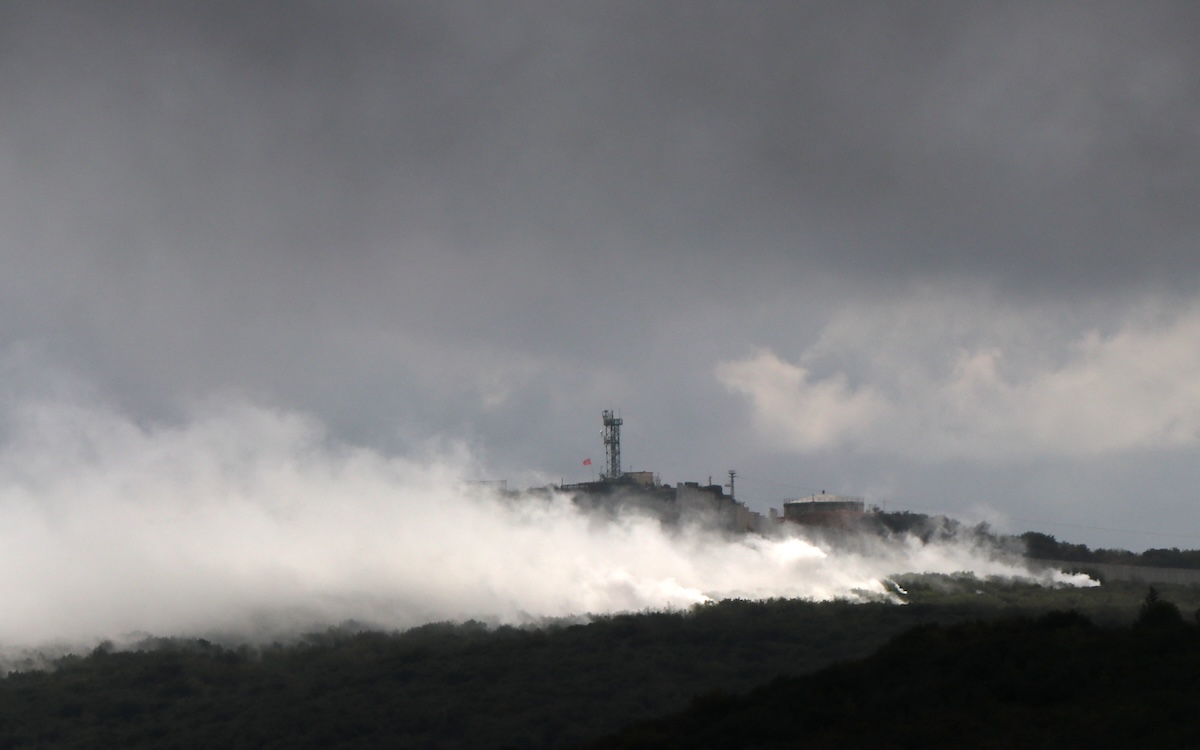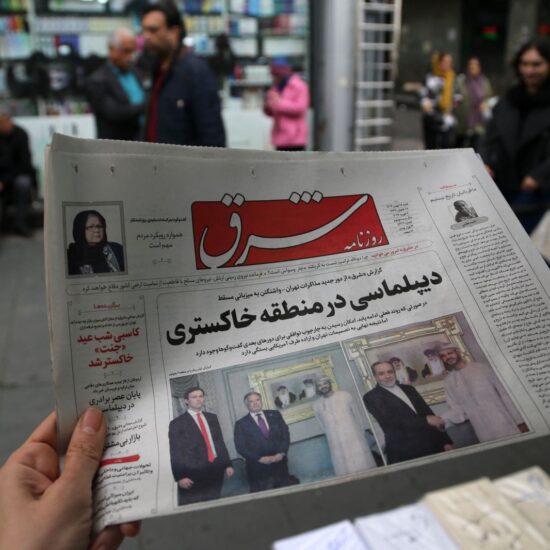
It is safe to say that Lebanon is on edge right now with the war between Hamas and Israel in Gaza entering its second week.
Throughout this first week, Hezbollah – along with its allies Hamas and Islamic Jihad – traded fire with Israel along the border.
#Hezbollah took credit for the targeting of several Israeli sites along the border that led to the ongoing clashes with #Israel along #Lebanon’s southern border. #لبنان #حزب_الله #إسرائيل pic.twitter.com/Y1P9jrwSVh
— Nicholas Frakes | نيكولاس فريكس (@nicfrakesjourno) October 15, 2023
Up until this point, even when the clashes seemed like they would get out of hand, they somehow narrowly avoided turning into a full-fledged war.
However, this has done little to placate people’s fears that, like in July 2006, Hezbollah could push things a little too far and Israel could overreact, leading to yet another highly destructive and bloody war that Lebanon does not want and cannot afford right now.
Hezbollah has made it clear that they are not looking to start a war, with Israel doing the same – largely because Israel is about to launch a ground invasion of Gaza and cannot spare the troops to properly combat Hezbollah – but that does not negate the possibility that things could simply just get out of hand.
In a speech to demonstrators, #Hezbollah’s deputy head Naim Qassem said that they are “fully prepared” and following “every moment” of what is happening. He added that Hezbollah will take action “within our plan and vision.” #حزب_الله #لبنان
— Nicholas Frakes | نيكولاس فريكس (@nicfrakesjourno) October 13, 2023
While many in Lebanon support Palestinian resistance to Israeli occupation, that number goes down drastically when asked if Lebanon should enter the war and directly support the Palestinian fight against Israel. Prior to the economic crisis, that number might have been higher, but now, four years into the crisis, and still in recovery from the 2020 port explosion, Lebanon literally cannot afford the conflict that would ensue.
With the situation seemingly only going to get worse from this point on, Lebanon will continue to live on edge for the foreseeable future.
In Lebanon
Killed: Issam Abdallah was doing his job as a Reuters videographer in the south of Lebanon when an Israeli bomb killed him and injured six other journalists on October 13.
In response, Israel said it did not know where the bomb came from and that it would look into the matter. The White House said that it was “deeply saddened” by Abdallah’s death and that “we know that the work that you all do is incredibly dangerous and today is a reminder of that.”
All of these were sorely lacking responses that meant nothing. Israel killed him just like it did 11 Palestinian journalists in Gaza since the war started. Just like it did Shireen Abu Akleh last year.
Yet there will be no justice for these slain journalists. They were Arabs and Israel was the one that killed them. No one will be held accountable and their names will be added to the growing list of journalists that Israel has killed with impunity over the years.
Bluster: During a regional tour, Iranian Foreign Minister Hossein Amirabdollahian made some big remarks during his visit to Lebanon.
“I know about the scenarios that Hezbollah has put in place,” the foreign minister said. “Any step the resistance (Hezbollah) will take will cause a huge earthquake in the Zionist entity.”
While these may seem like escalatory words – and they are accurate in the sense of how devastating a war between Hezbollah and Israel would be for both sides – they are likely just rhetoric coming from Iran.
Iran needs to keep up its tough image against Israel in the same way that Hezbollah is launching smaller-scale attacks against Israel in the South. They do not want to get directly involved in the war, but they also cannot just sit around and do nothing.
Awkward: Last year, Lebanon and Israel signed a maritime border demarcation agreement that finally established the sea borders between the two countries – with Lebanon getting the rawer end of the deal.
This deal was made quickly because of the possibility of tremendous natural gas reserves in Block 9, more commonly known as the Qana Prospect, off the coast of Lebanon. For the Lebanese political leaders, this was a godsend. No longer would Lebanon need an agreement with the International Monetary Fund to get out of the economic crisis; Lebanon has gas money that would make the country rich once more. Lebanon’s political leaders touted this as the fix to all of Lebanon’s problems.
The only problem with that is, according to sources who spoke with Reuters, there is no gas or oil to drill out. During the exploratory phase, the drill only found water and could not detect any gas or oil reserves.
It appears that Lebanon’s political leaders will have to find another solution to Lebanon’s economic crisis.
A legacy: On October 15, it was announced that journalist Giselle Khoury, wife of the late Samir Kassir, had died after a battle with cancer.
Khoury was a successful journalist who founded Lebanon’s biggest press freedom advocacy organization SKeyes Center for Media and Cultural Freedom, which stemmed from the Samir Kassir Foundation that she established after Kassir’s untimely death.
Every year, everyone would wait and see who would receive that year’s Samir Kassir awards for their work in journalism.
Khoury will undoubtedly be missed by many, and the hole that she left behind can never be filled.
Fire: A fire broke out in Tripoli during the evening of October 15 along the Abu Ali bridge.
It is unclear what started the fire, but it left many structures along the river in smolders.
Another fire broke out in the area in 2019 that devastated the area, as many residents owned small second-hand shops that they depended on to make a living.
In the region
The war goes on…and gets worse: It has been just over a week since Hamas carried out a deadly operation against Israel that killed over 1,300 people in a single day, in which they also kidnapped over 150 people.
Since then well over 2,000 people in Gaza have been killed by Israel’s indiscriminate bombings, and face a wider humanitarian crisis as Israel lays “siege” to the enclave.
Hamas continues to fire rockets daily into Israel, but they are mostly intercepted by Israel’s Iron Dome air defense system. Everyone knows that this is all just a precursor for Israel’s ground invasion of Gaza as Israel seeks to “destroy” Hamas in what will be a futile effort, as the ideology of Hamas is not something that can be killed with a bullet or a drone strike.
The ground invasion will likely last weeks, if not months, and it will be a bloody and grinding conflict in which everyone will lose.
Hamas has already threatened to execute hostages, so who knows what will happen in the event of a ground invasion. Israel has already killed countless Palestinians at a whim from the air, so will that worsen during the incursion?
This will be a brutal fight in which countless people will die and the region will be irrevocably altered.
US Secretary of State Antony Blinken has been on a regional tour to try and shore up support for Israel. Not to try to bring an end to the fighting, but to get more countries and leaders in the region to back Israel to mixed results.
The leaders of the region and the world tried to ignore the Palestinian cause and pretended that it was not something to concern themselves with anymore.
Clearly, this “new Middle East” that has been discussed in recent weeks cannot exist until the Palestinian question is first addressed.
No-fly zone: After projectiles were launched from Syria into northern Israel, Israel proceeded to bomb the runways in Syria’s airports in Damascus and Aleppo.
According to Syrian authorities, these airports are now out of service until they can be repaired.
These marked the first Israeli strikes on Syria since the start of the war with Gaza.
What we’re reading
Locally made: Lebanon used to primarily import the vast majority of its goods rather than producing them locally. Rodayna Raydan wrote about how this is starting to shift with more locally made products making their way onto the shelves.
Money: Maan Barazy wrote a couple of pieces, with the first looking at how the war with Gaza is affecting the economic situation in the region. The second looked at the funds misused by the Lebanese government.
A worsening crisis: The situation in Yemen has been dire for years, only deepening after Saudi Arabia began bombing the country. Now, The Washington Post’s Kareem Fahim, Ali al-Mujahed and photographer Lorenzo Tugnoli reported on how climate change and rising temperatures will only further exacerbate the situation in Yemen.
Lebanon+
Podcasts: This week’s podcasts had some repeat visitors. On The Beirut Banyan, musician Mateo el-Khodr paid a visit after having been on Sarde after dinner a few weeks prior. El-Khodr discussed his art, being an artist in Lebanon and free expression.
Comedian Shaden Fakih also returned to Sarde after dinner to talk about religion, the crackdown on freedoms in Lebanon and the collective mental health in the country.
Until next week, follow NOW Lebanon on Twitter, Instagram, Facebook, and LinkedIn. And free Palestine!








